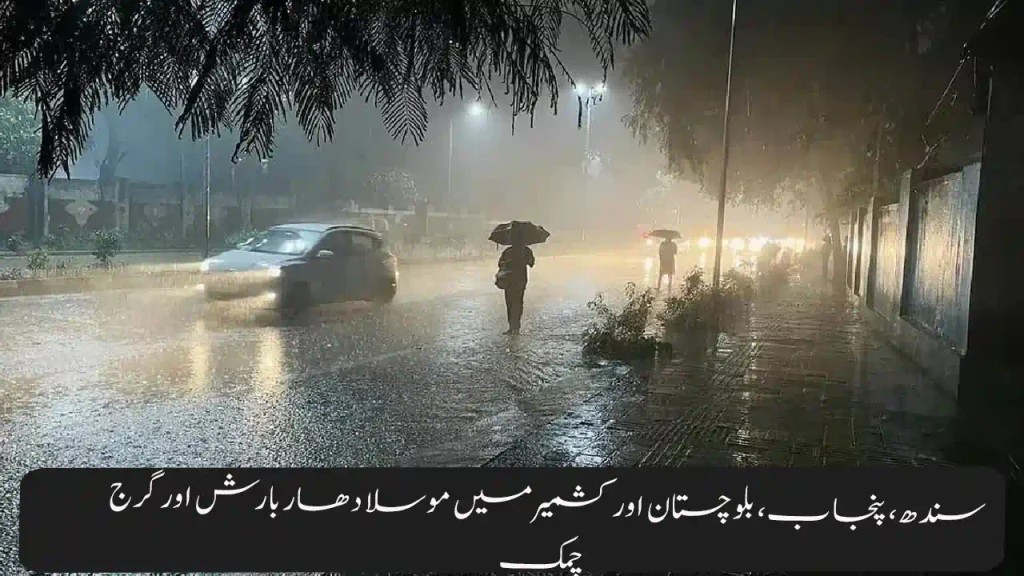Heavy Rain & Thunderstorms Expected in Sindh Punjab Balochistan & Kashmir

Pakistan’s Meteorological Department has issued a comprehensive weather alert for multiple regions of the country, forecasting heavy rains, thunderstorms, and gusty winds in specific areas while others remain under the grip of humid and hot conditions.
Let’s break down the latest developments and what you should expect.
⚠️ Rain and Storm Alert: Regions Likely to Be Affected
Upper & Southeastern Sindh
Areas including Sukkur, Larkana, and parts of Tharparkar and Badin are expected to witness thunderstorms with gusty winds. There is also potential for heavy rainfall in certain localities, particularly in the evening hours.
Southern Punjab
Districts such as Multan, Dera Ghazi Khan, and Bahawalpur could face localized heavy rain, particularly in the late afternoon and night. Strong winds may cause tree falls and temporary power disruptions.
Northeastern & Southern Balochistan
Quetta, Kalat, Khuzdar, and adjoining areas are forecast to receive widespread showers, some of which may become intense over short durations. Flash flooding in local streams and hill torrents is possible.
Kashmir & Gilgit-Baltistan
In the north, parts of Kashmir and Gilgit-Baltistan are likely to experience moderate to heavy thunderstorms, especially during the evening and night hours. Hilly terrains could face temporary landslides or travel interruptions.
Islamabad, Upper Khyber Pakhtunkhwa & Northeastern Punjab
The federal capital, along with areas such as Abbottabad, Murree, Rawalpindi, and Lahore, is expected to receive scattered showers and thunderstorms during the evening and late-night hours. Cloud bursts are possible in some pockets.
🌡️ Elsewhere: Hot & Humid Conditions
While storms loom over parts of the country, the rest of Pakistan will remain hot and muggy. Temperatures in cities like Karachi, Hyderabad, Faisalabad, and Peshawar may cross 38–42°C, accompanied by high humidity, causing discomfort during daytime hours.
🌧️ What’s Causing This Weather?
The current conditions are being influenced by:
- Moist air currents from the Arabian Sea entering southern and central Pakistan.
- A western disturbance interacting with these currents, leading to instability in the upper regions.
- Surface heating from the intense sun, triggering convective thunderstorms in the afternoons and evenings.
⏱️ Timing & Duration of Expected Rain
- Daytime: Expect dry, hot weather in most regions except for isolated showers in Sindh and Balochistan.
- Evening/Night: Increased chance of widespread showers, especially in Punjab, Khyber Pakhtunkhwa, Islamabad, and Kashmir.
These conditions are expected to continue through the next 48–72 hours, with slight fluctuations in intensity.
⚠️ Safety Tips During Heavy Rain & Thunderstorms
- Avoid unnecessary travel, especially in hilly or flood-prone areas.
- Secure outdoor items like flower pots, satellite dishes, or lightweight structures.
- Stay away from electric poles and open fields during lightning activity.
- Farmers should drain excess rainwater to protect crops, especially cotton and vegetables.
- Urban residents are advised to avoid underpasses and low-lying roads to prevent being stranded.
🌍 Regional Summary
| Region | Forecast Summary |
|---|---|
| Upper/Southeastern Sindh | Thunderstorms, heavy showers in places |
| Southern Punjab | Gusty winds with patchy heavy rain |
| Southern & NE Balochistan | Intermittent rain, possible flash floods |
| Kashmir & GB | Evening thunderstorms, landslide risk |
| Islamabad & NE Punjab | Nighttime rain with strong gusts |
| Rest of Pakistan | Very hot and humid weather |
. Which areas of Pakistan will be most affected by the heavy rain and thunderstorms?
The most affected areas include Upper and Southeastern Sindh, Southern Punjab, Northeastern and Southern Balochistan, Kashmir, Islamabad, Upper Khyber Pakhtunkhwa, and Northeastern Punjab. These regions are expected to receive thunderstorms, gusty winds, and heavy rainfall, especially during the evening and night hours.
. How long will the current weather pattern last?
Answer:
According to the Pakistan Meteorological Department, this rain spell is expected to last 48 to 72 hours from July 21, 2025. However, intensity and coverage may vary by region. Hot and humid conditions will persist in areas not affected by rainfall.
What precautions should people take during this weather?
Avoid travel in flood-prone or hilly areas during rain.
Stay indoors during thunderstorms and lightning.
Keep drainage clear around homes.
Farmers should prepare for possible waterlogging in fields and protect vulnerable crops.
🔚 Conclusion
This seasonal monsoon activity is a normal part of July weather in Pakistan, but localized heavy rain and storms can cause significant disruption. Stay informed through weather bulletins, avoid risky travel, and prepare for sudden changes in conditions, especially in the evening hours.
Read this: Nine Terrorists Killed in KPs Malakand During Days-Long Joint Operation
Read this: All Kia Cars in Pakistan (2025) – Prices Variants & Features






